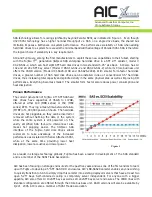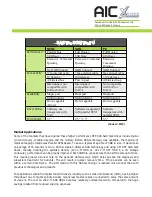
SCSI
SAS FC
Parallel Bus
Full Duplex
Full Duplex
3.2Gb/sec 3.0Gb/sec 4.0Gb/sec
Extensive Command
Queuing
Extensive Command
Queuing
Extensive
Command
Queuing
No XOR Support
XOR Support
XOR Support
12m internal cable
>6m external cable
6m external cable
15 devices
128 devices
>128 devices
Arbitrated bus
Peer to peer
Arbitrated loop
Interconnect not
compatible with
SAS or SATA
Interconnect
compatible with
SATA
Not compatible
with SAS or
SATA
Single port
Dual port
Dual port
Multi initiator
Multi initiator
Multi initiator
Hot swappable
(80 pin)
Hot swappable
Hot swappable
Software not
transparent with
SAS
Software transparent
with parallel SCSI
Software
transparent with
parallel SCSI
3.5”
2.5” / 3.5”
3.5”
(Source: IDC)
Advanced Industrial Computer, Inc.
Xtore Extreme Storage
Market Applications
Some of the markets that have desired these higher performance SFF SAS hard disk drives include digital
content delivery, medical imaging and the military. Before SAS technology was available, the majority of
medical imaging storage was Parallel SCSI based. To save a typical image file of 3GB in size, it would take
an average of 15 seconds or more. With scalable 3.0Gb/sec SAS technology and using 2.5” SFF hard disk
drives, thereby doubling the spindles’ density (12x 3.5” HDD vs. 24x 2.5” SFF HDD in a 2U storage
enclosure), performance can be greatly improved. Each 3GB file can take less than half the amount of time.
This means greater turnover rate on the patients’ data/records, which helps quicken the diagnosis and
subsystem treatment for patients. The end result is quicker recovery time. More patients can be seen
within a certain time frame. The ROI made with this SAS technology is realized much sooner than with
previous technologies and products.
For applications within the digital content delivery industry such as Video On Demand (VOD), having higher
throughput due to higher spindle density means less master copies are needed to serve the same amount
of viewers. The cost on the 2.5” SAS HDDs becomes relatively unimportant when compared to the huge
savings realized from reduced copying expenses.
Performance
Connectivity
Availability
Driver Model
Form Factor
SAS vs. SCSI vs. FC








